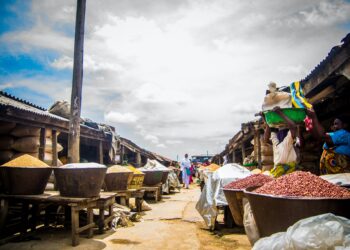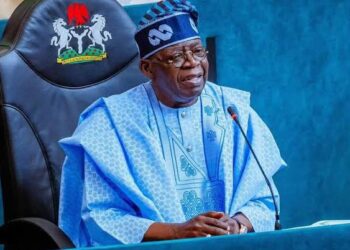Nigeria’s Vision 20: 2020, like a number of other development ambitions, has failed woefully. Instead of rising to at least the 20th globally by GDP, the World Bank says Nigeria is currently 31st globally with GDP as of March 12, 2024.
After Nigeria rebased its economy in 2014, its GDP rose from $270 billion to $510 billion, and placed it in the 24th position globally and number one in Africa.
The 15 places that fall over time are the consequences of poor economic performance occasioned by fluctuating oil prices and inimical economic policies in Nigeria, as well as better showing by other countries competing countries, notably in the same global economic environment.
Conceived by former President Olusegun Obasanjo in 2006, the blueprint of Vision 20:2020 was launched in September 2009 by late President Umaru Yar’Adua’s administration amidst fanfare.
Nigeria’s Vision 20:2020 represented a grand ambition, a blueprint designed to propel the nation into the league of the world’s top 20 economies by the year 2020.
Recommended reading: Lessons from 10 years of market returns
It was a vision fueled by hope, promising transformative change, economic prosperity, and a better quality of life for all Nigerians.
Yet, despite its noble intentions and lofty aspirations, Vision 20:2020 ultimately faltered, falling short of its envisioned outcomes. Several factors contributed to its failure, casting a shadow over Nigeria’s pursuit of sustainable development and inclusive growth.
Dr. Godwin Imoibe, lecturer at the Department of Banking and Finance, University of Nigeria, Enugu Campus, has noted that although the vision was a lofty one, the fundamentals were poor.
He said the country depended too much on income from the sale of crude oil to achieve its Vision 20: 2020.
According to him, when the prices of crude oil started to decline in 2015 onward, the foundation of the envisioned success of the vision collapsed, coupled with the fact that the non-oil sector was not growing as expected.
Dr. Ayodele Bello, a development economist, told Nairametrics that one of the primary reasons for the failure of Vision 20:2020 was the lack of sustained political commitment and leadership continuity.
He said while the vision was crafted with meticulous detail and comprehensive strategies, the frequent changes in government administrations led to inconsistency in policy implementation and a lack of coherence in vision execution. “Each new leadership brought its own agenda, often deviating from the trajectory set by Vision 20:2020, thereby eroding the momentum needed for meaningful progress.
- “Moreover, Nigeria’s socio-political landscape, marred by corruption, bureaucratic inefficiency, and governance challenges, posed significant obstacles to the realization of Vision 20:2020. Rampant corruption within government institutions undermined the effective allocation of resources and eroded public trust, siphoning funds away from critical development projects and stifling economic growth. Bureaucratic red tape and regulatory bottlenecks further impeded progress, hindering private sector investment and stifling entrepreneurial innovation.”
On his part, the chief executive of the Center for the Promotion of Private Enterprise, Dr. Muda Yusuf, told Nairametrics that the important thing is continuity of policy.
He said when you look at the history of Nigeria, for each administration there is always a different kind of vision. “By our democracy, the maximum time any administration has is eight years. That lack of continuity is a major issue that affects our various visions for development. The visions rarely transcend political or regime boundaries.
- “Then all of those developmental agenda also need investments from the private sector. In any developmental mission, there is always a private sector component that is also very huge. Unfortunately, the investment environment over time has not been fixed to support that kind of long term investment. But the private sector investment has also been going down because of macroeconomic, structural and security issues. If you look at the Foreign Direct Investment (FDI) you will notice that it has been on the decline.
- “Another major issue we have been having is that the government has been sitting on some critical sectors, particularly oil and gas. And the quality of our public institutions has been declining over time. When you leave such critical sectors in the hands of bureaucrats and politicians, those things progressively decline. The kind of leverage oil and gas would have given us, we lost at a point. We didn’t manage those assets well because the quality of our institutions have been declining, particularly our public service. And when you don’t have good bureaucracy, it affects your policy; it affects your implementation, transparency, and a whole lot of things because bureaucracy is like the engine room for any administration, but unfortunately, the situation has degenerated. Those things were causing serious problems for us. It’s only now that we are trying to get things right,” Yusuf said.
Also commenting, economic affairs analyst, Dr. Bayo Johnson, noted that despite the vision’s emphasis on economic diversification, little progress was made in reducing the country’s dependence on oil, exacerbating the challenges of sustainable development and inclusive growth.
- “Additionally, inadequate infrastructure, limited access to finance, and a challenging business environment stifled the implementation of key initiatives outlined in Vision 20:2020. The lack of critical infrastructure, such as power, transportation, and telecommunications, constrained economic activities and impeded productivity growth. Similarly, the dearth of financing options for entrepreneurs and small businesses hampered investment and job creation, exacerbating unemployment and poverty rates,” he stated.
He added that security challenges, ethnic tensions, and social unrest further undermine Nigeria’s pursuit of Vision 20:2020 goals. “Persistent conflicts in certain regions of the country, coupled with widespread poverty and social inequalities, diverted attention and resources away from development priorities, exacerbating social tensions and undermining national cohesion,” he said.
In hindsight, the failure of Vision 20:2020, Vision 2010, the 7-point Agenda and a host of others, serves as a sobering reminder of the complexities inherent in nation-building and economic transformation. It underscores the need for comprehensive reforms, strong governance, and sustained political will to overcome entrenched challenges and achieve sustainable development.
As Nigeria charts its course towards a brighter future, it must learn from past mistakes, address systemic weaknesses, and forge a renewed vision that prioritizes inclusivity, equity, and resilience. Only through collective effort, visionary leadership, and unwavering determination can Nigeria realize its full potential and embark on a path of sustainable growth and prosperity for all its citizens.
























